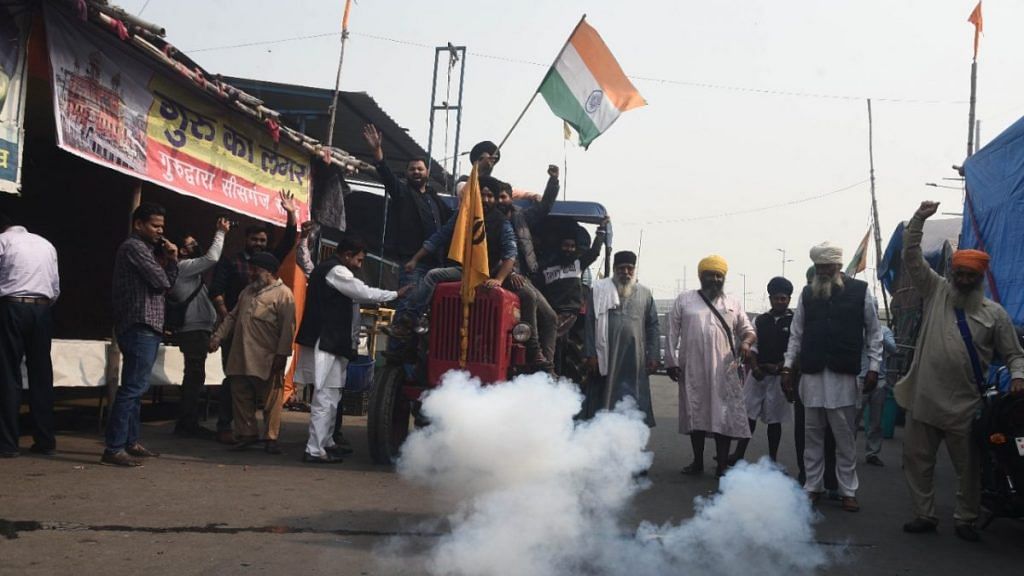Dehradun, Bengaluru: Prime Minister Narendra Modi’s announcement Friday morning, repealing the three contentious farm laws, took the nation by surprise. It was no different for the BJP-ruled states of Uttarakhand and Karnataka, which had brought in their own statutes based on the Union government’s legislation.
But while one government has hailed the PM’s decision, the other says it was not only caught by surprise, but has been left confused.
Uttarakhand and Karnataka weren’t the only states to implement a version of the farm laws. Others included Gujarat, Uttar Pradesh, Madhya Pradesh, and Himachal Pradesh.
‘No impact’ in Uttarakhand
The Uttarakhand government has welcomed PM Modi’s decision to repeal the legislation, and is claiming that it will have no impact on its newly-promulgated farm laws.
After hours of complete silence on the issue, CM Pushkar Singh Dhami welcomed the decision Friday evening.
“The Prime Minister is committed to the welfare of the farmers. I welcome the Prime Minister’s announcement to repeal the three agriculture laws,” he tweeted. “This decision will lead to the growth of brotherhood in the country.”
In line with the chief minister’s tentativeness, BJP leaders in Uttarakhand had strict instructions from the party leadership to not speak on the matter until a clear guideline comes from the national leadership.
However, speaking to ThePrint, state Agriculture Minister Subodh Uniyal said the Centre’s laws were already put on hold due to the Supreme Court’s decision in January, staying their operation, and the repeal will have no impact on the state’s Uttarakhand Agricultural Produce and Livestock Marketing Act (APM Act), 2020, modelled on the central farm laws.
The Act, an amended version of the Uttarakhand Agriculture Produce Marketing Committee (APMC) Act, 2011, gave up the government’s control on mandis. It paved the way for the creation of multiple mandis. This included allowing individuals, parties or groups to obtain licences for setting up their own agri-produce markets or mandis that could offer competitive price regimes.
“The Union government’s agriculture laws passed in September 2020 were stayed by the Supreme Court of India. As the matter was pending with the SC, the final nod was awaited for its adoption in Uttarakhand,” Uniyal said. “We did not implement it. However, now the three laws stand null and void, so for us, the status quo on agri-laws is maintained.”
“Talking about it’s implementation is worthless in the existing circumstances. The Uttarakhand government did not implement the Essential Commodities Act and Contract Farming Act passed by the Centre,” he added.
Uniyal further said the APM Act is here to stay. “The APM 2021 was an amendment in our 2011 APMC law to provide effective regulation of marketing and setting up of proper marketing mechanisms for farmers’ produce in the state. It was a state act,” the minister said.
Also read: 5 reasons why farmers won the farm laws battle against Modi govt
Karnataka ‘confused’
The PM’s decision caught the Karnataka government completely unawares, according to J.C. Madhuswamy, the state’s law and parliamentary affairs minister.
“The announcement came as a surprise to us too. There were neither consultations nor intimation. We are yet to discuss what is to be done at the state level,” Madhuswamy told ThePrint.
“We will write to the Union government and take actions according to their directions,” he added.
In December last year, the BJP government in Karnataka — then led by B.S. Yediyurappa — passed the Karnataka Agricultural Produce Marketing (Regulation and Development) (Amendment) Bill, 2020, its own version of the Centre’s Farmers’ Produce Trade and Commerce (Promotion and Facilitation) Act, 2020, which sought to modify the APMC law.
While Karnataka’s BJP government did not formulate a state version of the Farmers (Empowerment and Protection) Agreement on Price Assurance and Farm Services Act, 2020, or Essential Commodities (Amendment) Act, 2020, it came up with a law to liberalise land as part of its “agricultural reform”.
The Karnataka Land Reforms (second Amendment) Act, 2020, was also passed in September 2020 amid much protest from farmers and the opposition.
“While we need to discuss the amendment to the APMC Act with the Union government, we will not withdraw the land reforms act since it is a state act and will have no impact from the union government’s decision,” Madhuswamy said.
Karnataka Agriculture Minister B.C. Patil also told ThePrint that the Union government’s decision needed to be studied in the state’s context. “We were taken unawares. I will discuss what we should do with our laws with the chief minister next week,” Patil told ThePrint.
But while his ministers were left confused, Chief Minister Basavaraj Bommai backed PM Modi.
“PM Modi has said the three farm laws will be withdrawn in the next session considering farmers’ sentiments. This shows the government is responsive,” Bommai told reporters Friday afternoon.
The opposition in Karnataka, however, is keen on urging the state government to withdraw the legislation. “The decision was more political than administrative. The decision has come from the party to the government and hence the state government too will have to repeal its legislation. We demand clarity on the matter before the winter session begins,” Krishna Byre Gowda, Congress MLA and former state agriculture minister, told ThePrint.
(Edited by Arun Prashanth)
Also read: In its 2 terms, Modi govt has now repealed 2 contentious legislations before assembly polls
